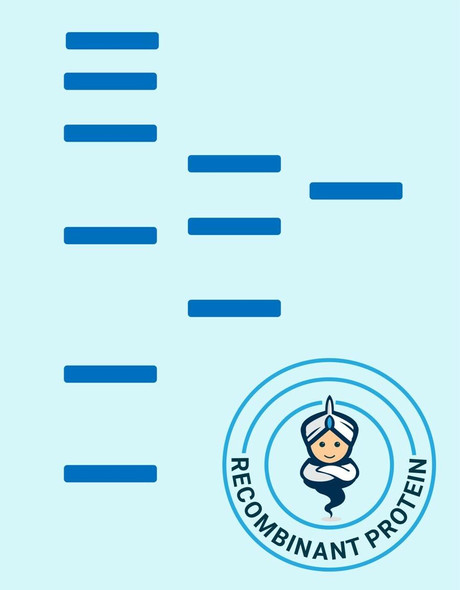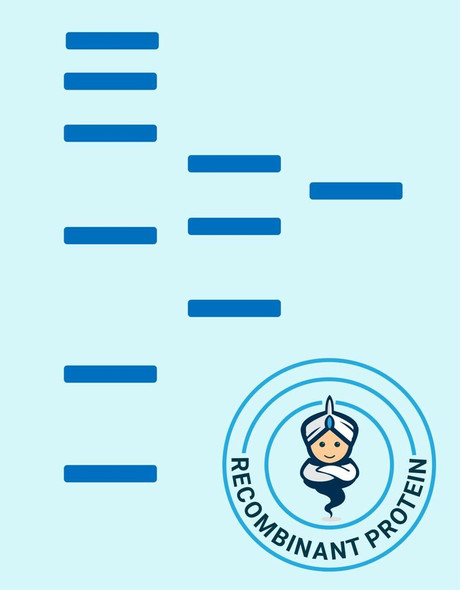Description
| Product Name: | Human VASP Recombinant Protein |
| Product Code: | RPPB5112 |
| Size: | 10µg |
| Species: | Human |
| Target: | VASP |
| Synonyms: | Vasodilator-stimulated phosphoprotein, VASP. |
| Source: | Escherichia Coli |
| Physical Appearance: | Sterile Filtered colorless solution. |
| Formulation: | The VASP solution (0.5 mg/ml) contains 20mM Tris-HCl buffer (pH 8.0), 5mM DTT, 10% glycerol, 200mM NaCl and 0.1mM PMSF. |
| Stability: | Store at 4°C if entire vial will be used within 2-4 weeks. Store, frozen at -20°C for longer periods of time. For long term storage it is recommended to add a carrier protein (0.1% HSA or BSA).Avoid multiple freeze-thaw cycles. |
| Purity: | Greater than 85.0% as determined by SDS-PAGE. |
| Amino Acid Sequence: | MGSSHHHHHH SSGLVPRGSH MSETVICSSR ATVMLYDDGN KRWLPAGTGP QAFSRVQIYH NPTANSFRVV GRKMQPDQQV VINCAIVRGV KYNQATPNFH QWRDARQVWG LNFGSKEDAA QFAAGMASAL EALEGGGPPP PPALPTWSVP NGPSPEEVEQ QKRQQPGPSE HIERRVSNAG GPPAPPAGGP PPPPGPPPPP GPPPPPGLPP SGVPAAAHGA GGGPPPAPPL PAAQGPGGGG AGAPGLAAAI AGAKLRKVSK QEEASGGPTA PKAESGRSGG GGLMEEMNAM LARRRKATQV GEKTPKDESA NQEEPEARVP AQSESVRRPW EKNSTTLPRM KSSSSVTTSE TQPCTPSSSD YSD |
Vasodilator-stimulated phosphoprotein (VASP) belongs to the Ena-VASP protein family. VASP is linked with filamentous actin formation and likely plays a widespread role in cell adhesion and motility. In addition, VASP may be involved in the intracellular signaling pathways which regulate integrin-extracellular matrix interactions.
VASP Human Recombinant fused with a 20 amino acid His tag at N-terminus produced in E.Coli is a single, non-glycosylated, polypeptide chain containing 363 amino acids (1-343 a.a.) and having a molecular mass of 37.5kDa (Molecular weight on SDS-PAGE will appear higher). The VASP is purified by proprietary chromatographic techniques.
| UniProt Protein Function: | VASP: vasodilator-stimulated phosphoprotein. Actin- and profilin-binding microfilament-associated protein. The phosphorylation of VASP is dynamically regulated by cellular adhesion to extracellular matrix. |
| UniProt Protein Details: | Protein type:Cytoskeletal; Motility/polarity/chemotaxis Chromosomal Location of Human Ortholog: 19q13.32 Cellular Component: filopodium membrane; tight junction; focal adhesion; cytoplasm; plasma membrane; cytosol; actin cytoskeleton Molecular Function:protein binding; actin binding; SH3 domain binding; profilin binding Biological Process: axon guidance; positive regulation of actin filament polymerization; actin polymerization and/or depolymerization; neural tube closure; T cell receptor signaling pathway; protein homotetramerization |
| NCBI Summary: | Vasodilator-stimulated phosphoprotein (VASP) is a member of the Ena-VASP protein family. Ena-VASP family members contain an EHV1 N-terminal domain that binds proteins containing E/DFPPPPXD/E motifs and targets Ena-VASP proteins to focal adhesions. In the mid-region of the protein, family members have a proline-rich domain that binds SH3 and WW domain-containing proteins. Their C-terminal EVH2 domain mediates tetramerization and binds both G and F actin. VASP is associated with filamentous actin formation and likely plays a widespread role in cell adhesion and motility. VASP may also be involved in the intracellular signaling pathways that regulate integrin-extracellular matrix interactions. VASP is regulated by the cyclic nucleotide-dependent kinases PKA and PKG. [provided by RefSeq, Jul 2008] |
| UniProt Code: | P50552 |
| NCBI GenInfo Identifier: | 1718079 |
| NCBI Gene ID: | 7408 |
| NCBI Accession: | P50552.3 |
| UniProt Secondary Accession: | P50552,Q6PIZ1, Q93035, B2RBT9, |
| UniProt Related Accession: | P50552 |
| Molecular Weight: | 380 |
| NCBI Full Name: | Vasodilator-stimulated phosphoprotein |
| NCBI Synonym Full Names: | vasodilator-stimulated phosphoprotein |
| NCBI Official Symbol: | VASP�� |
| NCBI Protein Information: | vasodilator-stimulated phosphoprotein |
| UniProt Protein Name: | Vasodilator-stimulated phosphoprotein |
| Protein Family: | Vasodilator-stimulated phosphoprotein |
| UniProt Gene Name: | VASP�� |
| UniProt Entry Name: | VASP_HUMAN |






